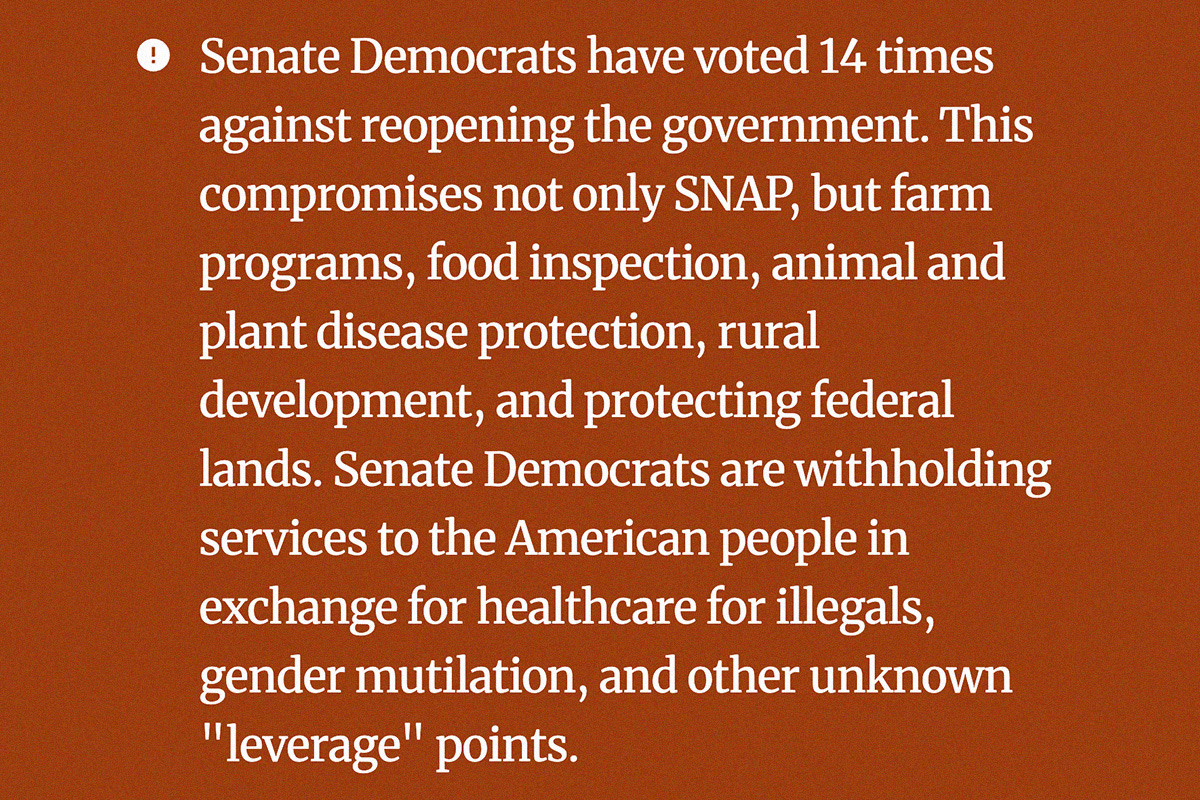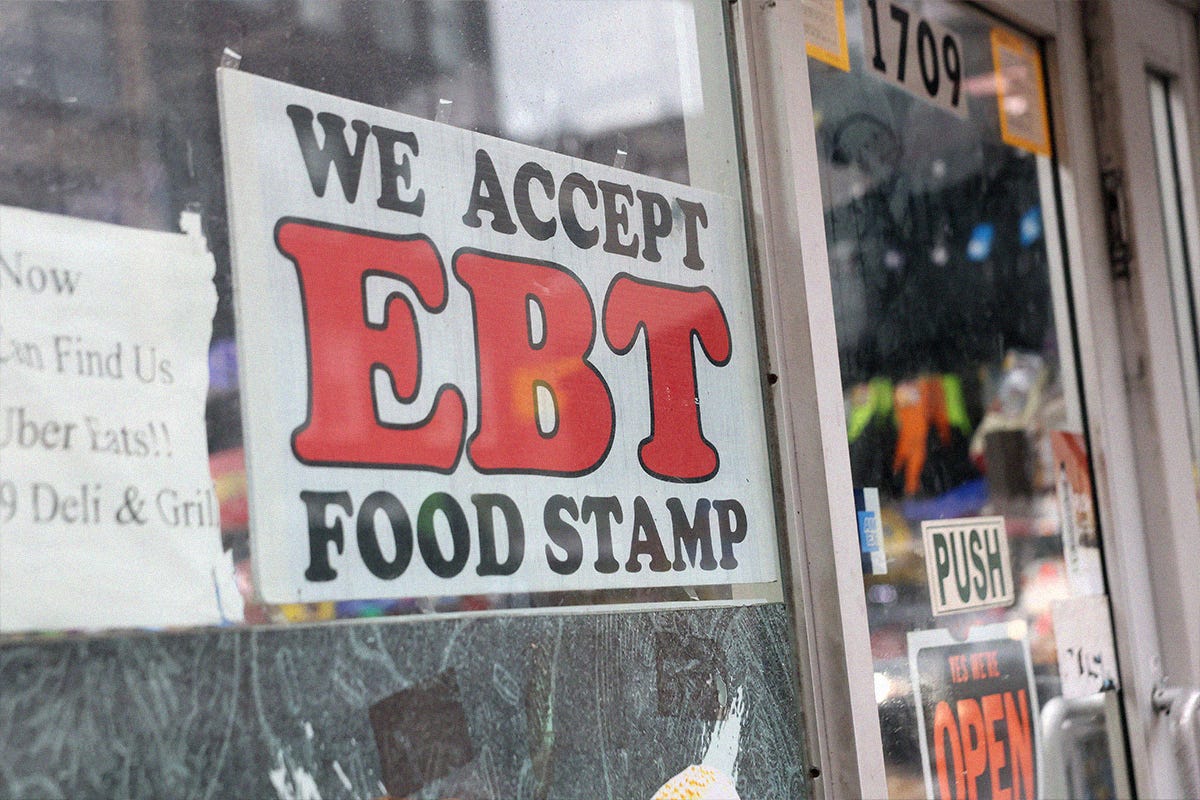Trans Americans Are Struggling to Survive the SNAP Crisis, Even As Trump Scapegoats Them
Trans people already face relentless political attacks. Now they’re being blamed for a crisis that threatens their ability to eat.
Trans people are used to the Trump administration blaming them for everything, but being scapegoated for the current food stamp crisis especially stings.
“It’s like we are in this game: Whenever something in the world goes sideways, trans people are always one of — if not the first — targets for Republicans to blame,” Cadence Pierce, 40, tells Queer Agenda. “My friends and I often joke about the Iago meme: ‘I think I’m going to have a heart attack and die from not surprise.’ I’m used to it, but every time, I get frustrated and irritated. How does anyone buy the nonsense?”
Pierce is one of the estimated two million LGBTQ+ Americans who presently rely on the Supplemental Nutrition Assistance Program (SNAP), known colloquially as food stamps. Those benefits, which provide an estimated 40 million Americans with up to $100 billion in food assistance each year, will be dramatically reduced and significantly delayed amid the longest government shutdown in U.S. history. The closure has resulted from a congressional standoff over a federal budget bill: Democrats oppose proposed GOP cuts to Affordable Care Act (ACA) subsidies that would dramatically increase health care costs for millions of Americans.
As the impasse over the ACA continues, the official website of the United States Department of Agriculture (USDA) engaged in a particularly Trumpian obfuscation. In a message posted on October 27, the federal agency claimed that SNAP benefits are being blocked by Democrats who “continue to hold out for healthcare for illegal aliens and gender mutilation procedures.” Over a week later, the statement remains pinned to the USDA’s homepage, despite the claim being patently false.
Even as trans people are unjustly censured for the SNAP quagmire, the reality is that they are disproportionately likely to rely on monthly assistance to meet their food needs. LGBTQ+ adults are 36% more likely to be enrolled in the SNAP program than their cisgender, heterosexual counterparts, according to an analysis from the Williams Institute, a pro-LGBTQ+ think tank at the University of California, Los Angeles. Of LGBTQ+ people who reported receiving regular nutritional assistance, 66% were disabled, and 69% had a household income under $35,000 annually.
It makes sense that the trans community would be uniquely reliant on these resources, which are designed to aid low-income populations: Trans people are disproportionately likely to be unemployed, unhoused, living under the poverty line, or a combination of all three. During the pandemic, trans respondents were three times as likely as cisgender people to report not having enough to eat, per the Williams Institute’s research.
Some trans Americans tell Queer Agenda that they aren’t sure how they are going to get by without the necessary benefits that SNAP provides. Iris Marrah, 29, receives the maximum allowable individual benefits every month, which are currently set at $292, and still struggles to pay her household bills. Marrah is unable to work due to a severe strain of Ehlers-Danlos syndrome — a connective tissue disorder that, in her case, has resulted in skin tears, bruising, and cyclical vomiting — and 80% of the monthly Supplemental Security Income she receives goes to rent. Marrah already overdrafts her bank account every single month, even if she doesn’t spend a dollar on food outside of her allotted SNAP budget.
With the future of SNAP now in limbo, not knowing how she is going to pay for electricity or where her next meal may be coming from has been a disquieting experience. Marrah has a history of disordered eating and worries that any changes to her usual food intake might retrigger old behaviors. “I have been in a very dark place, but what has kept me holding on is not wanting to give them what they want,” Marrah says, noting that she has experienced increased suicidal ideation in recent weeks. “It’s miserable. Existence is not great. Basically, I live out of spite.”
Others voiced the same anxieties: unsure of what the coming days hold without the certainty of being able to fill their pantries. Samuel James, 35, says that he has enough to get by for the next two weeks, but after that, he isn’t sure how he is going to feed himself. Howie Rhodes, 34, fears being forced to choose between paying for his groceries and his monthly medications. Without the generosity of her landlords, Tela Rose, 55, says that she would likely end up on the street: “All I know how to do is get through today. That’s where I have to keep my focus: on making sure I have something to eat and getting through each day.”
While conservatives have long painted SNAP recipients as “lazy” and “welfare queens,” many of those who spoke with Queer Agenda say that the program has helped them rebuild their lives. Marrah was forced to leave a previous job after her employer refused to give her accommodations for her disability, causing her to pass out during a shift. After a series of stays in mental health facilities over the past three years, Liz Phillips, 41, was hoping that being on SNAP would help her find some stability; instead, she now anticipates being forced to beg for money from friends on social media.
“This administration and the ruling party are pitting my existence and my ability to be myself against my ability to eat,” Phillips, who requested the use of a pseudonym in this story, tells Queer Agenda. “I’ve spent so much of my life trying to be someone I’m not, and when I actually am finally starting to become myself, it’s under threat. I’m going to do my damnedest to survive this.”
Government leaders are hopeful that a shutdown deal may be in sight after a 36-day standstill. In order to end the shutdown, at least eight Senate Democrats must cross the aisle to join Republicans in voting for the funding bill — thereby crossing the 60-vote threshold to avoid a filibuster. Senate Majority Whip John Thune (R-S.D.) expressed optimism that a compromise was in sight, telling reporters this week that he believes congressional lawmakers are “getting close to an off ramp here.” Although some centrist Democrats reportedly are open to concessions, others oppose giving in to the drastic ACA cuts that the GOP is seeking.
Befitting his tactic of laying the blame elsewhere, Trump has been sending mixed signals on his willingness to end the crisis, saying he will only negotiate after the government is reopened. Claiming that Democrats “have lost their way,” he predicted in a 60 Minutes interview that the party would cave: “I think they have to. And if they don’t vote, it’s their problem.” (It’s also unclear how Trump will respond to a federal ruling ordering the government to fully fund the SNAP program, given how often he has ignored court mandates before.)
Despite the fact that trans people have very little to do with the intraparty strife in Congress, it has played out a now-familiar pattern amid Trump’s second term in office. Since January, the White House has directly targeted trans access to accurate passports, affirming sports participation, and necessary health care. More than 21 hospitals have discontinued gender-affirming treatments for minors as a result of the federal administration’s threats, and the Department of Health and Human Services is currently pursuing a new rule that would effectively amount to a national ban on trans youth health care. Trans people have become such a cursory target that Trump even railed against transgender mice during a March speech to Congress.
If being scapegoated for the SNAP crisis is perhaps further insult to injury, trans people are doing what they always do: figuring out how to survive, often under unenviable circumstances. Many sources for this story credited food banks for stepping up to support vulnerable populations, and in Rose’s home state of Washington, Gov. Bob Ferguson (D) has issued an additional $2.2 million to local pantries during the government shutdown. “I feel really lucky that we have a community that really steps up when things are hard,” she says.
Some worried, though, that a breaking point may be coming soon: of being forced to bear too much of society’s burdens. Pierce insists that trans people simply want what everyone else wants — to live authentically and without scrutiny — but that can be difficult when certain government leaders don’t even want you to eat. “Every time another attack gets lobbed at trans people, it wears you down little by little,” she says. “When is too much going to be too much?”








So sad. These politicians won’t be there forever is what I keep telling myself.